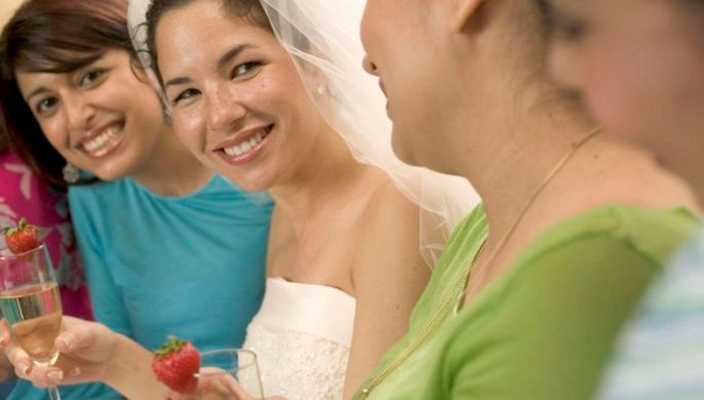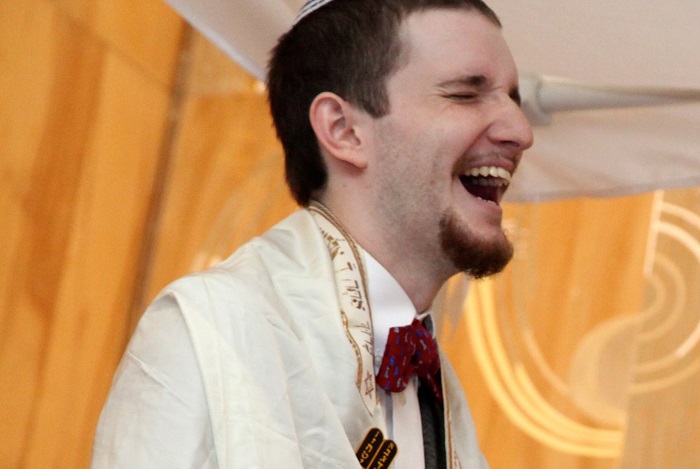
As Jews, we are often pointedly aware of our minority status in the larger fabric of society. We have friends, family, and associates who do not share our religion, and our differences often seem most obvious during times of celebration: the winter season, the High Holy Days, and yes, at weddings.
My wife and I, recently married, hail from very different backgrounds. I am a Jew by choice from a Pentecostal family. Of that family, only my mother and I are in contact. By contrast, my wife’s closer, more diverse family represents Jews, Catholics, Protestants and more – many of whom were present at our wedding. Though we were married in one of the oldest Reform shuls in the country, our guest list was very diverse and our Jewish friends and family were decidedly outnumbered. We were sensitive to this fact as we began to plan our ceremony.
My wife and I experience our Judaism differently. In prayer and ritual, if not diet, I lean toward tradition; my wife describes herself as a cultural Jew. Much like in our home, we wanted our wedding day to strike a balance between religious and secular, traditional and contemporary.
When the big day came, we were honored to receive an enthusiastic response. Afterward, we reflected on what worked, what could have gone differently, and what we learned. It’s important to note that there’s no “right answer” for how to pull off a meaningful Jewish wedding – but here are some things to consider if your find yourself with a diverse guest list.
Emphasize your similarities. Celebrate your differences. Judaism is rich and complex. Its long history, deep traditions, and all that Hebrew might seem intimidating to some. Emphasizing what we share helps us to relax. Smile a lot! My wife and I often turned to face the guests and share a joke or comment. It wasn’t practiced; it just felt right in the moment. A warm, friendly energy helps keep the mood light, even when the ceremony is new or novel to guests.
Ask your rabbi or cantor for help. This is a no-brainer, but it’s easy to forget in the hustle of planning. Looking for ways to explain Judaism to newcomers? Need help choosing between different customs? Have questions about egalitarian and LGBTQ+ rituals? Rabbis and cantors are experts for a reason, so don’t be afraid to reach out for help. Our rabbi made the decision-making process much simpler and welcomed our guests with open arms. A gifted rabbi or cantor can make your wedding day come alive.
Don’t underestimate your guests. Your guests are smart, capable learners. Chances are, they’re excited to share the day with you. Give them some credit! Consider including Jewish FAQs (Frequently Asked Questions) on your wedding website, a guidebook to the parts of the ceremony, or a glossary of key terms. Instead of over-simplifying, consider offering necessary explanations when asked, and let the logic of the ceremony speak for itself.
If it doesn’t exist, create it! The Jewish wedding ceremony is about 20 minutes from beginning to end. This leaves room for creative additions. To facilitate more guest participation, we added English readings alongside the traditional (seven blessings recited over the bride and groom). Furthermore, we included a brief reading acknowledging the oppression of same-sex partners, who at the time, couldn’t legally marry in our state. Whatever the addition, don’t be afraid to put your own stamp on a classic ceremony.
Experiment with tradition. Jewish tradition has a lot to offer. The beauty of liberal Judaism is our freedom to blend centuries of customs into a new, meaningful whole. Don’t be afraid to look to the past for inspiration! Our wedding day was very traditional in many ways -- afternoon prayer () before the service; an early reception and signing; traditional liturgical arrangements; a short seclusion () for bride and groom post-ceremony; and the , a festive reception meal with food, music, and celebration. While some are more common among Reform Jews than others, have fun experimenting with the traditions that are meaningful to you.
Don’t be afraid to make changes. My wife and I skipped the , and not a single note of "Hava Nagila" was heard that day. These pieces are an iconic staple, and we were first torn about not including them, if only for our guests’ sake. Still, we decided to go with our gut and excise them. Feel comfortable making the day your own. Your guests will adapt, and liberal Jewish communities are open to a variety of customs and practices.
Don’t forget what it’s all about. Wedding planning can be stressful. Creating a religious experience that can be shared by all adds to the stress. Remember why you’re doing it: to celebrate your love. Keeping what matters most in mind will put things in context when you’re tempted to sweat the small stuff. Enjoy; this is your big day! !

